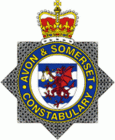Avon and Somerset Constabulary
| Avon and Somerset Constabulary | |
|---|---|
|
Badge of the Avon and Somerset Constabulary | |
| Agency overview | |
| Formed | April, 1974 |
| Preceding agencies | |
| Employees | 5996 |
| Volunteers | 428 |
| Annual budget | £280 million -(2012–13)[1] |
| Legal personality | Governmental: Government agency |
| Jurisdictional structure | |
| Operations jurisdiction* | Police area of Avon and Somerset in the country of England, UK |
.svg.png) | |
| Map of police area | |
| Size | 1,855 square miles (4,800 km2) |
| Population | 1.5 million |
| Legal jurisdiction | England & Wales |
| Constituting instrument | Police Act 1964 |
| General nature | |
| Operational structure | |
| Overviewed by | Independent Police Complaints Commission/Her Majesty's Inspectorate of Constabulary |
| Headquarters | Portishead |
| Constabless | 3,398 |
| PCSOss | 381 |
| Police and Crime Commissioner responsible | Sue Mountstevens |
| Agency executives |
|
| Child agency | SouthWest one |
| Divisions | 6 |
| Facilities | |
| Stations | 39 |
| Airbases | Filton Airport |
| Police cars | 660 |
| Police motorcycles | 28 |
| Helicopters | 1 Eurocopter EC135 |
| Website | |
| www.avonandsomerset.police.uk | |
| Footnotes | |
| * Police area agency: Prescribed geographic area in the country, over which the agency has usual operational jurisdiction. | |
Avon and Somerset Constabulary is the territorial police force in England responsible for policing the non-metropolitan county of Somerset and the now-defunct county of Avon, which includes the city and county of Bristol and the unitary authorities of Bath and North East Somerset, North Somerset and South Gloucestershire.
History
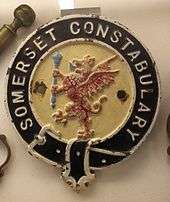
The first police force in England was formed in Covent Garden by Somerset born novelist Henry Fielding, in 1748.[3] In 1835, Bristol and Bath became the first to create their own police forces in the county itself, after that year's Municipal Corporations Act. The original Bristol constabulary had 232 officers issued with a top hat, blue coat and white trousers.[4] this constabulary began certain practices that were eventually adopted country-wide, including recruiting female officers (with 13 on patrol by 1918[4]) and photographing prisoners. Bridgwater and Chard followed with their own constabularies in 1839, with all forces being merged into the Somerset Constabulary in 1940, under the County Police Act.
The force as it is today was created on 1 April 1974, the same day as Avon, from a merger of the Bristol City Police, the Somerset and Bath Constabulary, and the Staple Hill division of Gloucestershire Constabulary. It was the only force to provide a mounted escort for the Queen during her Royal Jubilee tour of Bristol in 1977.[4]
Avon & Somerset Constabulary provides service for approximately 1.5 million people, and is the sixth largest police force in England & Wales.[4]
The Chief Constable was Nick Gargan, selected by Sue Mountstevens to replace Colin Port, following his decision not to re-apply for the position after the Police and Crime Commissioner (PCC) announced on 22 November 2012 that she would invite applications for the role rather than extending his contract.[5] In January 2013, Port took the PCC to court to seek an injunction to block the interviews of candidates for the post of Chief Constable.[6] In mid-May 2014, Gargan was suspended by Commissioner Mountstevens following allegations of 'inappropriate behaviour towards female officers and staff'. The enquiry into the allegations was referred to the Independent Police Complaints Commission (IPCC).[7] Gargan is reported by the Commissioner to have denied the allegations. During the period of Gargan's suspension, the force was run by the Deputy Chief Constable, John Long. Gargan resigned in October 2015.[8]
Archives
Records of the Bristol Constabulary and Avon and Somerset Constabulary are held at Bristol Archives (Ref. Pol) (online catalogue).
Governance
The constabulary is overseen by the Avon and Somerset Police and Crime Commissioner, a new elected position which replaced the Avon and Somerset Police Authority in November 2012. The police and crime commissioner is scrutinised by the Avon and Somerset Police and Crime Panel, consisting of elected councillors from the police area. The first police and crime commissioner, who was elected on 15 November 2012 and took office on 21 November 2012, is Sue Mountstevens.[9] She had previously been a magistrate and a member of the police authority,[10] and had stood for election as an independent.
Organisation & Senior Management
The headquarters of the force is currently Portishead in North Somerset, close to the B3124, it was chosen as the site for the new HQ when the Bristol Constabulary's Bridewell Headquarters was deemed to be too small to continue serving as the Force's HQ. The Portishead complex cost £31 million to construct and was opened by Queen Elizabeth II on 2 June 1995.[4]
Avon and Somerset Police use a total of 41 police stations.
It is the second force that uses the right to have 2 serving Deputy Chief Constables along with Police Scotland, as DCC Rob Beckley QPM is currently seconded to the College of Policing as Chief Operating Officer
Divisions
South Gloucestershire
- Chipping Sodbury
- Patchway
- Concorde House
- Thornbury - Only a beat office
Bath and North East Somerset
Bristol
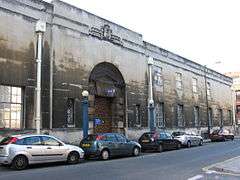
|
|
North Somerset
|
East Somerset
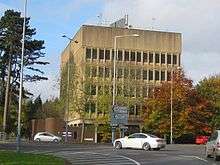
West Somerset
|
|
Basic Command Unit structure
Each Basic Command Unit (BCU) has several specialist teams, namely:
- Neighbourhood Policing Team (NPTs), each with local Beat Managers and PCSOs. The NPTs concentrate on preventing and detecting local crime and targeting offenders, building contacts in the local community, resolving problems by working with local organisations and individuals, and being visible and accessible.
- Targeted Patrol Teams responding to emergency calls.
- Traffic Units patrol the roads and target and pursue people committing traffic offences, this includes Traffic PCSO's.
- Criminal Investigation Departments (CID) detect serious crime
- Forensic Services investigate crime scenes for forensic evidence that may correspond with many of the Home Office databases.
- Pro-active Policing Units target persistent criminals and focus on specific operations.
- Dog Units are officers who patrol with dogs and respond to incidents where a police dog is required.
Headquarters-based teams
To support the BCUs, several centralised teams operate from the Portishead headquarters:
- Senior Management
- Criminal Investigation Department
- Major Incident Planning
- Major Investigation Team
- Armed Response Group
- Counter Terrorism Group
- Air Operations Unit
- Emergency Communications Centre
- Force Contact Centre (SNEN)
- Intelligence
- Corporate communications
Operations
National Police Air Service Air Operations Unit
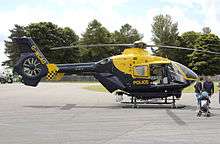
The Western Counties Air Operations Unit is a police helicopter based at Filton Airport, that is shared between Avon and Somerset Constabulary and Gloucestershire Constabulary, who both own half the aircraft. The helicopter is staffed by officers of both forces and features various technology including thermal imaging, a nite-sun spotlight and Global Positioning System (GPS) and radio tracker systems. The aircraft has a scramble time of two minutes. The helicopter can also be used as an air ambulance when required. This is now under the control of the NPAS.
Road Policing Unit
The Road Policing Unit (RPU) is now part of a Tri Force Collaboration with Wiltshire and Gloucestershire Constabularies that is specifically focused on policing the roads and motorways of Avon and Somerset and the adjoining police areas. This collaboration also encompasses the Armed Response Units and Police Dog Patrols. The RPU has 55 cars and 28 motorcycles.[11] The RPU has three bases, Almondsbury, Weston-Super-Mare and Taunton.
Support Group Unit
Avon and Somerset Constabulary has a Support Group that specialise in very specific needs of investigations or missions, such as police divers, football match management and explosive searching.[12] The officers chosen for Support Group duties are physically elite and have passed extensive tests.
Mounted Division Unit
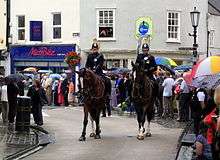
Although considered a luxury in other forces, Avon and Somerset Constabulary have a division of mounted police due to the many events that attract large crowds in the area such as Badminton Horse Trials, Glastonbury Festival and Bristol Rovers Football Club. The unit consists of 12 bred bay geldings. The unit is occasionally loaned to neighbouring forces as Avon and Somerset are the only West Country police force with a mounted division.[13]
Presentation
Headgear
Avon and Somerset Police officers wear the traditional custodian helmet in the rose style with a Brunswick star that reads 'Avon and Somerset Constabulary', for foot patrol. And a peaked cap for when on mobile patrol in vehicles, and a white peaked cap for traffic officers. Female officers wear a bowler hat, or a white bowler hat for traffic officers.
Uniform
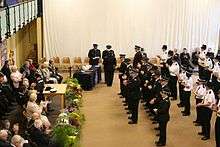
When on duty officers wear the traditional white shirt and black tie, covered with a black stab vest reading 'Police' on the front and back. Avon and Somerset no longer use the traditional police jumper, having favoured the black fleece with 'Police' written on the chest and back. Avon and Somerset officers do not have Brunswick stars on their epaulettes, just the rank and/or collar number. Female officers do not wear the black and white checkered cravat.
Formal dress comprises an open-necked tunic, with white shirt/blouse and tie. Constables and Sergeants wear custodian helmet's and collar numbers on their epaulettes, all higher-ranked officers wear peaked caps, name badges and their rank on their epaulettes. The No.1 uniform is accompanied by black boots or shoes and occasionally black gloves, or brown gloves for the rank of Inspector and above.
Equipment
Avon and Somerset Constabulary use a variety of standard UK Police equipment including TETRA digital radios, rigid handcuffs, CS spray and the ASP collapsible baton. Some officers also routinely carry the TASER Stun device designed to electrically shock a subject making them fall to the ground and to be subdued.[14]
During late 2009 Avon and Somerset Constabulary introduced mobile data terminals and Personal Digital Assistants (PDA) to some of its operational vehicles and front line officers. This is steadily being rolled out across the force. Most front line officers now have their own PDA designed to assist the officer in his/her day to day tasks and allows them to spend more time out of the station.
Livery
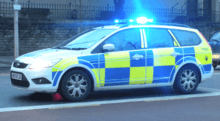
The Avon and Somerset Constabulary uses the modern blue and yellow retro-reflective square Battenburg markings on all of its operational vehicles. This style of livery was introduced in 2005, when the traditional 'jam sandwich' style police markings were removed in favour of the new livery, thought to aid officers responding to emergency calls by allowing the public to quickly and clearly identify the vehicle as belonging to the police.[15] The square livery also aids in the visibility of the force, which is perceived to enhance public confidence. Marked vehicles also show the force's Internet address on the rear and the word 'POLICE' across the bonnet. However, the force's crest is no longer used on most vehicles.
Name
Avon and Somerset Constabulary has kept the same name since it was formed in 1974, before which its preceding forces had separate names.
Strength and recruitment
Avon and Somerset Constabulary employs 6,754 people and 428 volunteer Police Officers within the Special Constabulary. 2,873 are Police Officers as at March 2013,[16] 535 are Police Community Support Officers and 2,491 are support staff.[17]
Performance
British Crime Survey
Avon and Somerset are making varied progress in fighting crime and maintaining public support. Overall 124,89 crimes were recorded in Avon and Somerset during 2009/10. Nationally recorded crime fell by 9%.
This included a 22% fall in car crime, a 19% fall in fraud, a 13% fall for robbery and criminal damage. However assault and sex crimes rose by 1% and 'Other Crimes' including public order offences, dangerous driving, possession of firearms, going equipped for stealing, and perverting the course of justice rose by 26%.[18]
In perceptions of police and crime, 65.2% of residents in Avon and Somerset believe that Avon and Somerset Constabulary is dealing with 'anti-social behaviour and crime that matters' in their area.[19]
Her Majesty's Inspectorate of Constabulary
For the year of 2009/10 Her Majesty's Inspectorate of Constabulary rated Avon and Somerset Constabulary as 'Fair' all categories including 'Local Crime', 'Protection from harm' and 'Satisfaction and Confidence'. It was particularly 'Good' in 'Reducing road death and injury' and particularly 'Poor' in 'Comparative satisfaction of BME [black and minority ethnic] community'. In value for money the force received 'Medium/High' status.[20]
Independent Police Complaints Commission
For the year of 2007/8 the Independent Police Complaints Commission received 800 complaint cases, an increase of 18& from 2006/7, compared to a 0% increase nationally. From which 1231 allegations were made, including 'Other neglect or failure in duty' and 'Incivility, Impoliteness and Intolerance' both 6% and 3% respectively lower than the national average. Avon and Somerset Constabulary was second lowest in its seven strong peer group.
Of the 1231 allegations made, 40% were investigated, 8% higher than the national average, 41% were resolved locally and 19% were withdrawn, dispensed with or discontinued. Of the 40% investigated, 12% were substantiated and 88% were unsubstantiated.
Proposed merger
In 2006 the Home Office announced plans to reduce the number of police forces in the UK from 42 to 24 in an attempt to save money. The plans were abandoned later that year due to lack of funding for the mergers, however the idea has resurfaced many times.
The proposed idea would see Avon and Somerset Constabulary merge with Gloucestershire Constabulary, Devon and Cornwall Police, Wiltshire Police and Dorset Police to form a 'super police force'.
The plans have been publicly criticised by all the involved forces, stating that it would lead to poor quality service and a reduction in local policing.[21]
In February 2010 plans for a merger of the four South West police forces: Avon and Somerset, Wiltshire, Dorset, Gloucestershire and Devon and Cornwall were re-evaluated by the Home Office in a bid to reduce spending.[22] All of the forces except Avon and Somerset were against an amalgamation. Following this Avon and Somerset Constabulary began purchasing uniform and equipment without the force crest. Instead identifying marks just read 'Police' without a force crest or reference to Avon and Somerset, the proposed merger to create a South Western Police Force has still not been ruled out as the Home Office and Central Government look to save funding.
Controversy
Race and sex discrimination in recruitment
In 2006, the force admitted it had contravened the Sex Discrimination Act and Race Relations Act when it deselected 186 white male candidates from its recruitment process solely because of their gender and race. Ralph Welsman, one of those discriminated against, sued the constabulary for their breach of employment laws and he received compensation in an out of court settlement. The policy was condemned by both the Police Federation and Commission for Racial Equality and it has now been abandoned.[23][24]
Officers killed in the line of duty
The Police Memorial Trust lists and commemorates all British police officers killed in the line of duty, and since its establishment in 1984 has erected over 38 memorials to some of those officers. Officers killed include:[25]
- Supt William Balkwill, 1900: Fatally injured while restraining a violent prisoner.
- DC Reginald Charles Grady, 1945: Collapsed and died during a violent arrest.
- PC David George Petch: Died 24 October 1981, aged 31, Killed when his traffic patrol car crashed following a speeding car.
- PC Peter Leonard Deans and PC Jonathan Michael Stapley, 1984: During a car chase their vehicle crashed and Deans and Stapley were fatally injured.
- WPC Deborah Leat, 1986: During a car chase Leat's vehicle crashed and she was fatally injured.
- PC Stephen Jones, 1999: Attempted to stop a stolen vehicle but was run over by it.
See also
- List of police forces in the United Kingdom
- Policing in the United Kingdom
- Table of police forces in the United Kingdom
- Police Credit Union
- reportMyloss.com
References
- ↑ "2012/13 Budget Consultation". Avon & Somerset Police Authority. Archived from the original on 18 January 2013. Retrieved 26 December 2012.
- ↑ "Back on the beat for new Chief Constable Nick Gargan". Avon and Somerset Police. 4 March 2013. Archived from the original on 11 July 2015.
- ↑ "Policing in London". Old Bailey Proceedings. Retrieved 7 April 2014.
- 1 2 3 4 5 History of the A&S Force from their site Archived 3 March 2007 at the Wayback Machine. retrieved on 15 March 2007
- ↑ "Statement - Chief Constable". Avon and Somerset Police and Crime Commissioner. 22 November 2012.
- ↑ "Avon and Somerset Chief Constable Colin Port taking PCC to court". BBC News. 7 January 2013. Retrieved 8 January 2013.
- ↑ O'Neill, Sean (13 May 2014). "'Police chief suspended over 'inappropriate behaviour towards female officers'". The Times. Retrieved 13 May 2014.
- ↑ "Nick Gargan: Avon and Somerset chief constable quits job". BBC News. 16 October 2015. Retrieved 16 October 2015.
- ↑ "Avon and Somerset PCC election: Sue Mountstevens wins". BBC. Retrieved 17 November 2012.
- ↑ "Your PCC". Police and Crime Commissioner for the Avon and Somerset Police Area. 16 November 2012.
- ↑ "Road Policing Unit" (PDF). Avon and Somerset Constabulary. Archived from the original (PDF) on 28 September 2011. Retrieved 14 December 2010.
- ↑ Avon and Somerset Constabulary – Support Group Archived 18 September 2010 at the Wayback Machine.
- ↑ Avon and Somerset Constabulary – Mounted Section Archived 18 September 2010 at the Wayback Machine.
- ↑ "THE use of electric stun guns by Avon and Somerset police officers has more than quadrupled in three years. - Bristol Post". Bristol Post.
- ↑ "Impact Assessment of The Road Vehicle Lighting Regulations amendment covering reflective markings on emergency vehicles" (PDF). Department of Transport. Retrieved 14 November 2010.
- ↑ "Tables for 'Police workforce, England and Wales, 31 March 2013". HM Government. Office for National Statistics. 31 March 2013. Retrieved 29 May 2014.
- ↑ "All staff and officers as at 28 February 2010". Avon and Somerset Constabulary. Archived from the original on 30 March 2010. Retrieved 12 December 2010.
- ↑ "crime figures avon and somerset police Bath - Bath Chronicle". Bath Chronicle.
- ↑ "Archived copy". Archived from the original on 29 July 2010. Retrieved 2010-08-06.
- ↑ "Reeport Card: Avon and Somerset". National Archives. Retrieved 26 December 2012.
- ↑ "Concerns over police merger plans". Salisbury Journal.
- ↑ "Concerns over police merger plans". Salisbury Journal.
- ↑ "Law - The Times". timesonline.co.uk.
- ↑ "Pay out to would-be policeman". BBC News. 14 March 2006.
- ↑ Police Roll of Honour Trust. "Police Roll of Honour Trust". policememorial.org.uk.
